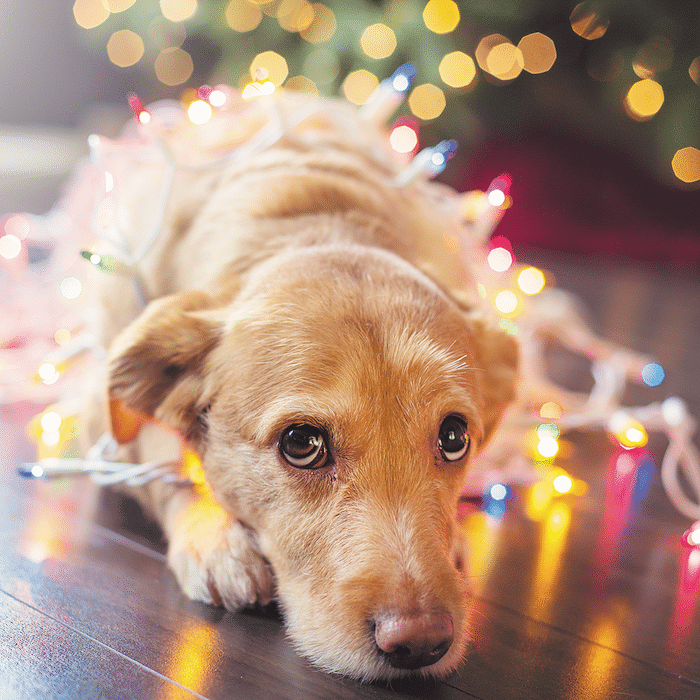The post Help! My Dog Ate Christmas by Dr. Catherine Ashe appeared first on Dogster. Copying over entire articles infringes on copyright laws. You may not be aware of it, but all of these articles were assigned, contracted and paid for, so they aren't considered public domain. However, we appreciate that you like the article and would love it if you continued sharing just the first paragraph of an article, then linking out to the rest of the piece on Dogster.com.
Winter holidays can be the most wonderful time of the year for humans and canines alike! Despite the seasonal merriment however, be aware of particular hazards that can occur. Dogs are curious and love to try out new, tasty treats (food and otherwise), and this season has an abundance of them. Unfortunately, some of them can turn your holiday into a disaster.
Not-so-tasty treats
Chocolate is a beloved holiday tradition. It’s not uncommon for a well-meaning loved one to wrap chocolates and place them under the tree. Your dog WILL sniff them out and devour them! Keep all food gifts well out of reach.
Fruit cakes containing raisins, sultanas and currants are not for canine consumption! Raisins, grapes and dried versions of them can cause kidney failure and should never be fed to dogs.
Xylitol is a commonly used artificial sweetener for humans. In dogs, it causes a severe drop in blood glucose and can also cause liver failure. Xylitol can be found in candies, gums and baked goods.
Turkey carcasses and ham bones are frequent leftovers from holiday festivities. Dispose of these safely to avoid accidental ingestion, which can lead to GI upset or, in more severe cases, pancreatitis and obstruction. While it’s tempting to include our dogs in the holiday meal, many foods are too fatty, salty or otherwise unhealthy for canines. As a result, it’s better to let them enjoy their own foods. If you must share a bit of the festive feast, skinless turkey meat, egg, green beans, peas and carrots can all be offered safely.
Problem plants
Poinsettia, mistletoe and Christmas trees are not as toxic as frequently advertised, but they can cause irritation and ulcers in the mouth and GI tract. The symptoms may include drooling and reluctance to eat due to mouth pain.
Holly berries, while technically toxic, are not life-threatening. In most cases, they cause self-limiting vomiting and diarrhea.
Dangerous decorations
Salt ornaments are a particularly serious risk. Ingestion of one of these can lead to dangerously high sodium levels. This is a true emergency.
Christmas lights, glass ornaments and hooks are all at risk of being eaten by the curious canine. Surprisingly, many of these can pass through the gastrointestinal tract and cause no damage. Despite this fact, any ingestion of these objects requires an immediate trip to the veterinarian.
Ribbons on gifts can pose a surprising threat. If ingested, they can cause obstruction of the stomach and/or small intestine. Keep all wrappings, particularly ribbons, away from your dog.
Preventing and solving holiday disasters
So, if you’re enjoying Christmas morning, and you notice your dog has ingested something, what should you do?
While a quick Google search is perfectly fine, do not let it replace professional help. And, do not attempt to induce vomiting at home. Hydrogen peroxide is a frequently recommended emetic, but administered incorrectly, it can lead to severe ulceration of the mouth, throat and stomach. Further, some objects such as glass, hooks and caustic substances, should NOT be vomited.
The ASPCA offers the poison control hotline for pets (888-426-4435). For a fee, you will be connected with a veterinarian who can recommend next steps. If veterinary care is advised, keep in mind that most general practice offices are closed on Christmas day. As a result, you will be seeking care at an emergency hospital. The fees associated with emergency hospitals are often higher than day practices, as a result of 24/7 availability and staff trained in handling a variety of emergencies.
With a little preparation and forethought, most of these unfortunate accidents can be avoided.
Helpful holiday tips:
- Do not put dog crates near trees, Christmas decorations or gifts that could be reached through the bars.
- Do not place any wrapped food items underneath the Christmas tree. Keep these on the counter,
out of reach. - Floral Christmas décor should be high enough that canine noses
can’t encounter it. - Only share lean meats and vegetables from the table, if you must. Avoid sugary and salty foods, and never offer raisins, grapes, currants, onions, garlic or chocolate.
Read Next: Can Dogs Eat Onions? If Your Dog Ate Onions, What Do You Do?
The post Help! My Dog Ate Christmas by Dr. Catherine Ashe appeared first on Dogster. Copying over entire articles infringes on copyright laws. You may not be aware of it, but all of these articles were assigned, contracted and paid for, so they aren't considered public domain. However, we appreciate that you like the article and would love it if you continued sharing just the first paragraph of an article, then linking out to the rest of the piece on Dogster.com.
Poop4U Blog
via www.Poop4U.com
Dr. Catherine Ashe, Khareem Sudlow



No comments: